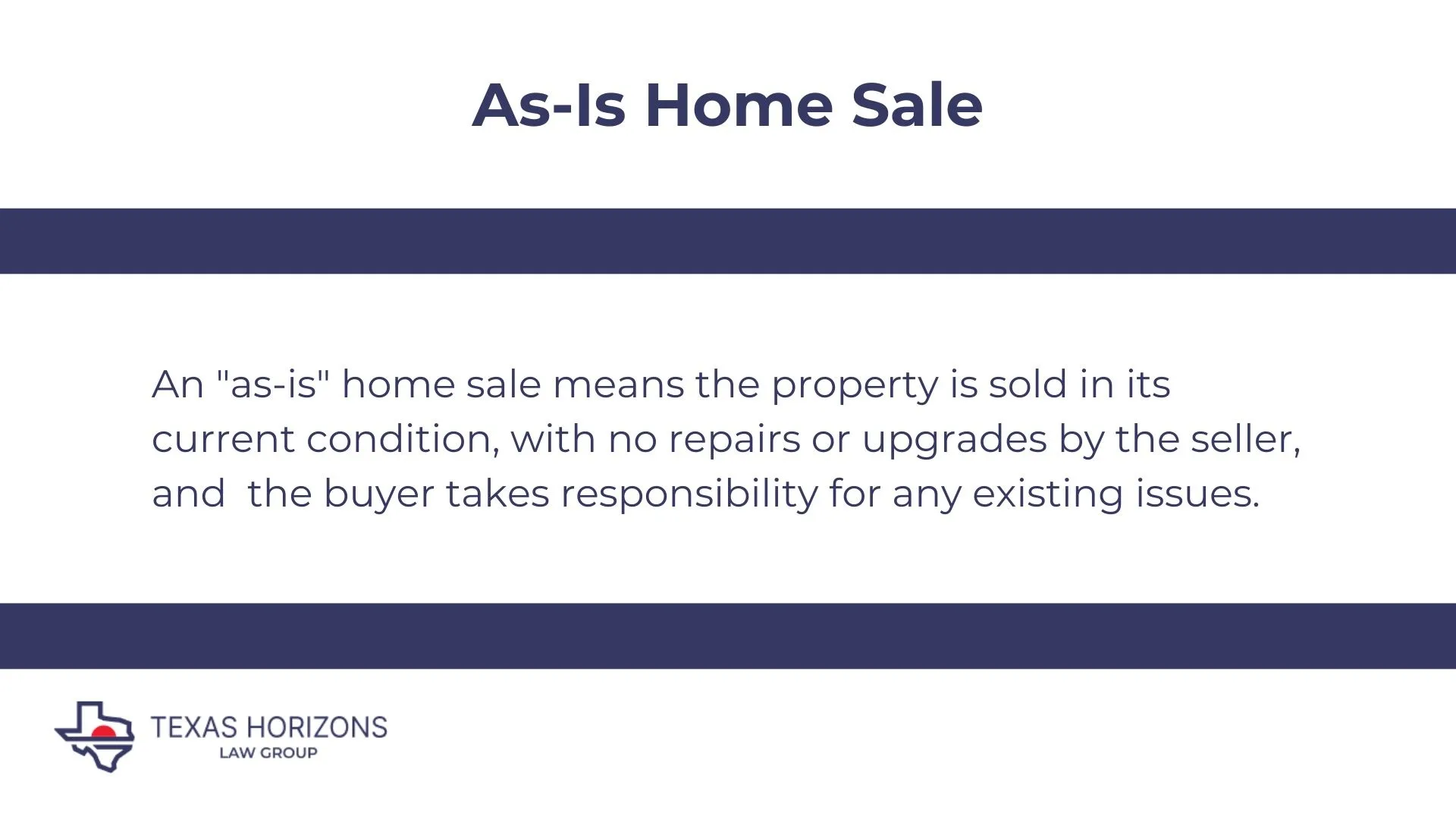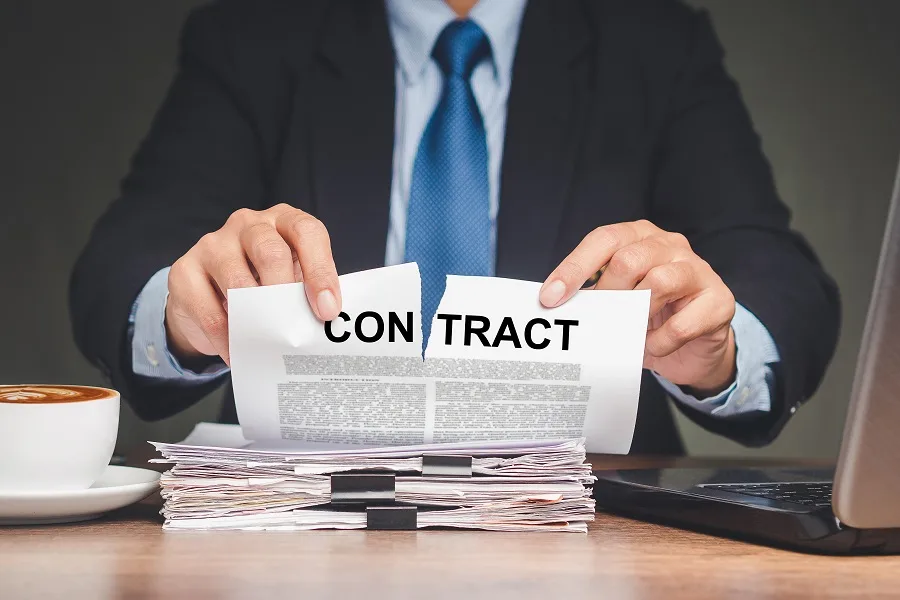When it comes to selling a house in Texas, homeowners may consider selling a home "as-is".
Sellers are increasingly investing in home improvements to attract buyers without reducing their asking price. For those who don’t have the time, resources, or desire to make significant repairs or upgrades, however, an as-is sale can be a better alternative.
In this article, the professionals at Texas Horizons Law Group will explain what it means to sell a house “as-is” in Texas, the steps involved in the process, and the pros and cons of this approach.
Whether you’re a first-time seller or a seasoned property owner, if you need guidance navigating the legal aspects of your real estate transaction, our board-certified real estate attorneys are here to help.
What Is Selling a House “As-Is” in Texas?

The concept of an as-is sale refers to the fact that the property is offered for sale in its current condition without any repairs, upgrades, or modifications on the seller's part. When a buyer purchases a home “as-is,” they agree to accept the property with all its flaws, whether they’re visible or hidden.
It’s important to note that selling a house “as-is” doesn’t exempt the seller from their legal obligation to disclose known defects or issues with the property. Texas Property Code requires sellers to provide a detailed disclosure form outlining any known problems with the home, such as structural issues, plumbing defects, or electrical malfunctions.
Types of Homes Commonly Sold "As-Is"
The real estate market features several categories of properties typically sold in as-is condition:
- Distressed homes: Homes needing major repairs, often sold as-is when costs are too high or time is limited.
- Inherited homes: Passed down to heirs who may not know the home’s condition; usually dated with deferred maintenance.
- Bank-owned properties: Foreclosures sold as-is with little information, minimal warranties, and extra paperwork.
- Investment liquidations: Investors unload underperforming properties as-is, often with tenant damage or unfinished work.
- Properties with major defects: Serious issues like foundation damage or water intrusion make these homes sell as-is to renovation-savvy buyers.
- Relocation sales: Owners moving quickly for work or personal reasons sell as-is with little prep.
- Development opportunities: When land value outweighs the structure, properties sell as-is for redevelopment potential.
What Are the Pros and Cons of Selling a House “As-Is”?

The pros of an as-is sale are that the seller is not required to make repairs and is generally not liable for unknown defects, as long as the seller did not make any misrepresentations or actively conceal material facts. The cons are that the buyer may want repairs made and can’t rely upon the seller’s representation that the repairs were properly made to the house.
Steps for Selling a House “As-Is” in Texas
Selling a property in its current condition involves a few extra considerations compared to a traditional home sale. Here are the steps required to navigate the process with confidence.
Complete the Seller's Disclosure Form Accurately
Texas law requires sellers to provide a detailed seller's disclosure form outlining any known defects or issues with their properties. It’s crucial to fill out this form thoroughly and accurately to avoid legal issues down the line. Consult a qualified real estate attorney for guidance if you're unsure what to include.
Include an As-Is Clause in the Purchase Contract
A contract with a clearly stated as-is condition clause should include that the buyer is relying upon the buyer’s own inspection of the property for determining the condition of the property and not relying upon any actions, representations, or omissions by the seller. While many real estate transactions in Texas use standard forms from the Texas Real Estate Commission (TREC), sellers who want to be sure that the as-is clause truly reflects their intent and protects their interests should have the clause drafted by a qualified real estate attorney.
Seller's Disclosure Obligations
It’s worth reiterating that “as-is” doesn’t mean sellers can avoid disclosing known problems. Texas law requires sellers to be truthful about any material defects in the property. If a seller withholds or downplays the cost of repairs, they may be held responsible for fixing those issues.
Can a Buyer Sue a Seller After Closing in Texas?
How long are you liable after selling a house in Texas? Sellers can be held responsible for hidden defects known to the sellers for up to four years after the sale if they fail to disclose them beforehand.
Buyer's Right to Terminate an As-Is Contract in Texas
The contract can include an option period during which time the buyer can thoroughly examine the property and make an informed decision. If, during this inspection period, they discover issues they aren’t comfortable with, they can back out of the contract without penalty or loss of their earnest money deposit.
Seller's Right to Cancel an As-Is Contract in Texas

Cancellation typically requires a demonstrable breach of contract by the buyer, such as missed deadlines or inability to secure financing. To navigate this scenario effectively and minimize potential legal ramifications, it’s highly advisable to consult a real estate attorney before attempting to cancel an as-is contract.
Making Your As-Is Home Sale Work
Selling "as-is" in Texas takes smart planning. Here's what works:
- Be honest but not rigid: Make it clear you're selling the property in its current state, but avoid phrases like "absolutely no repairs." Instead, mention that "the price reflects the home's condition." This keeps doors open for reasonable discussion.
- Know loan requirements: FHA and VA loans have minimum standards. If your house has major issues like foundation problems or water damage, these buyers might not qualify. Target cash buyers or those with conventional loans if your property has significant problems.
- Get repair quotes: Having professional estimates for major issues gives you credibility and helps buyers understand exactly what they're taking on.
- Set realistic expectations: Expect that offers may be lower than standard market value, and some interested parties may not proceed to serious offers. As-is properties often attract investors looking for deals, so be prepared for negotiation.
Setting the Right Price for Your As-Is Property

Pricing right can make or break your as-is sale. Here's how to get it right:
- Start with a good-condition value: Determine what your house would be worth in good shape, then subtract the repair costs. This gives you a realistic starting point.
- Read your local market: Hot markets might let you price higher even with problems. In slower areas, you'll need bigger discounts to generate interest.
- Know your buyers: Areas with strong rental markets attract investors, while established neighborhoods might draw DIY homebuyers. This affects what they'll pay.
- Highlight unique features: A great location, a large lot, or special architectural details can offset condition issues. Make sure these stand out in your listing.
- Build in negotiation room: Offer a price with some wiggle room, but stay reasonable. Most as-is buyers expect to negotiate.
- Adjust if needed: If you're not getting showings after a few weeks, it's probably your price. A quick adjustment is usually better than months of carrying costs.
Alternatives to Selling a House “As-Is” in Texas
Before committing to an as-is sale, consider these alternative approaches:
Strategic Repairs
Focusing on key improvements can broaden your buyer pool beyond investors. Addressing major systems or visible issues often yields better returns than selling "as-is," particularly when repairs are carefully selected for maximum impact.
Buyer Incentives
Offering targeted incentives, such as closing cost assistance or including appliances, can attract more buyers while maintaining your asking price. This approach often proves more cost-effective than significant price reductions.
Home Warranty Coverage
Adding a home warranty package addresses buyer concerns about future repairs without requiring immediate fixes. This option particularly appeals to buyers worried about post-purchase maintenance costs, potentially leading to more substantial offers.
Real Estate Agent's Role in "As-Is" Sales

Real estate agents bring essential expertise to as-is property sales in Texas. We determine competitive pricing based on market analysis and condition assessment while developing targeted marketing strategies highlighting a property's potential. We also manage legal compliance, particularly with Texas disclosure requirements, ensuring sellers avoid future complications.



